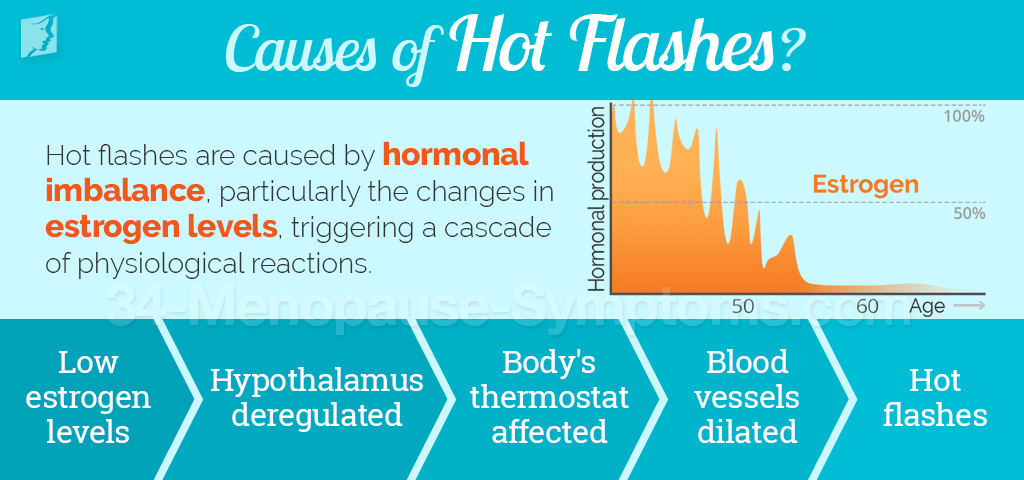Learning about the causes of hot flashes provides the key to understanding how to prevent and treat these troublesome attacks. While the exact causes of hot flashes are complex and not completely understood, research thus far has pointed to hormonal changes are the primary cause of hot flashes. In addition to these completely normal hormonal causes, other medical conditions can, in more rare instances, cause hot flashes.
Continue reading to learn more about the hormonal and other causes of hot flashes.
Hormonal Causes of Hot Flashes
The most common cause of hot flashes in menopausal women is changing levels of estrogen in the body. During the time leading up to menopause, most women will experience fluctuations in their hormonal levels, particularly decreased levels of estrogen.
Diminished amounts of estrogen have a direct effect on the hypothalamus, the part of the brain is responsible for controlling body temperature, among other functions.
Although the exact reason remains unknown, lowered estrogen levels "confuse" the hypothalamus, causing it to inappropriately sense that the body is overheating. The hypothalamus leaps into action, sending messages to the body to go into "cool down" mode, leading to flushing, sweating, and the other links in the chain of reactions that women experience as "hot flashes".
The estrogen withdrawal theory
Some experts believe that estrogen withdrawal affects certain neurotransmitters and ultimately causes hot flashes. Under this theory, the lack of estrogen causes the hypothalamus to signal the production of norepinephrine and serotonin.

These neurotransmitters are responsible for setting the point at which heat loss mechanisms are activated within the body. When more of these chemicals are produced, heat loss mechanisms are more easily triggered by subtle changes in core body temperature, thus causing hot flashes.
In addition to estrogen fluctuations during menopause, other conditions can also cause hot flashes. Keep reading to learn more about the other causes of hot flashes during menopause in order to gain a greater understanding of this symptom.

Other Causes of Hot Flashes
While by far the most common, hormonal changes are not the only cause of hot flashes. Certain medical conditions and medications can sometimes cause a person to experience hot flashes. For this reason, women for whom menopause is unlikely or women with other unexplained symptoms should consult a doctor to rule out these other potential causes of hot flashes.
Diseases That Can Cause Hot Flashes
- Panic disorder
- Infection
- Obesity
- Diabetes
- Hyperhidrosis
- Thyroid disease
- Cancer
Medications That Can Cause Hot Flashes
- Raloxifene (osteoporosis drug)
- Tamoxifen (breast cancer drug)
- Gonadotropin analogues (e.g., nafarelin)
While understanding the causes of hot flashes is a good first step, the next step is to learn about the different treatment options for hot flashes. Click on the following link to read about hot flash treatments.
Sources
- National Health Service UK. (2015). Hot flushes: how to cope. Retrieved March 15, 2016, from http://www.nhs.uk/Livewell/menopause/Pages/hot-flushes.aspx
- National Institute on Aging. (2015). What Can You Do for Hot Flashes and Other Menopausal Symptoms. Retrieved March 15, 2016, from https://www.nia.nih.gov/health/publication/menopause-time-change/what-can-you-do-hot-flashes-and-other-menopausal-symptoms
- Thurston, R.C. & Joffe, H. (2011). Vasomotor Symptoms and Menopause: Findings from the Study of Women's Health Across the Nation. Obstetrics and Gynecology Clinics of North America, 38(3), 489-501. doi: 10.1016/j.ogc.2011.05.006



